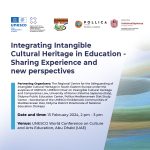World Conference on Culture and Arts Education
The Regional Centre Sofia took part in the World Conference on Culture and Arts Education. At the forum, held from 13 to 15 February in Abu Dhabi, UAE, UNESCO Member States adopted a new global Framework for Culture and Arts Education. Greater priority to culture and arts education, teacher training, more emphasis on indigenous cultures and local heritage in the classroom, greater recognition of artistic and cultural skills within the professional world – these are just some of the key commitments made by UNESCO at the Global Forum.
During the Conference, the Bulgarian Minister of Culture Krastyu Krastev actively participated and supported the side event on the topic “Integrating Intangible Cultural Heritage in Education – Sharing Experiences and New Perspectives”, organized by the Regional Centre Sofia – UNESCO. The side event was a joint organization of UNESCO Chair in Intangible Cultural Heritage and Comparative Law, the University of Rome, the Secretariat of the UNESCO Network of Mediterranean Emblematic Communities, Didyma Public Education Centre and the Board of Trustees of the Syrian Development Trust.
Irena Todorova, executive director of Regional Centre Sofia – UNESCO, said: “The Regional Centre seeks to disseminate living heritage conservation policies in its dialogue with a variety of institutions and organizations that, albeit indirectly, affect the subject. We are one of the few UNESCO Centres that maintain an active university network, which includes academics from 17 countries in Europe. Its aim is to build on educational programmes in culture, ethnography and anthropology by focusing more attention on intangible cultural heritage. Since its inception, UNESCO has become a unique global platform for cultural diplomacy, which to this day remains a benchmark for the exchange of ideas and knowledge, and above all – a tool for learning about each other’s culture and life. With the 2003 Convention for the Safeguarding of the Intangible Cultural Heritage, UNESCO gave a clear signal to States that the dynamics of the world require a more attentive attitude towards traditions, crafts, social practices and beliefs, without, however, losing the natural synergy between tangible and intangible cultural heritage. This forum, which is dedicated to culture and education, enables us to think of culture as a way of life, well integrated into our education systems, which preserves our national specificities but does not reject differences.”



